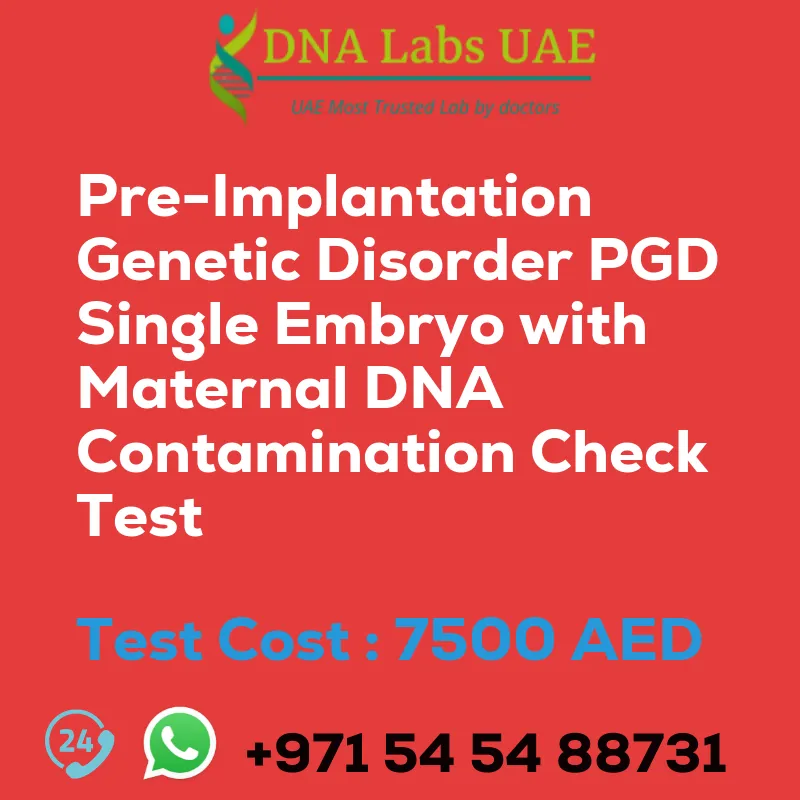Pre-implantation Genetic Disorder (PGD) Single Embryo with Maternal DNA Contamination Check Test
Test Name: Pre-implantation Genetic Disorder (PGD) Single Embryo with Maternal DNA Contamination Check Test
Test Components: Please request collection material
Price: 7500.0 AED
Sample Condition: Trophectoderm
Report Delivery: 15-20 days
Method: Sanger Sequencing
Test Type: Genetics
Doctor: Gynecologist
Test Department:
Pre Test Information: Pre-implantation Genetic Disorder/PGD (Single Embryo) with maternal DNA contamination check can be done with a Doctor’s prescription. Prescription is not applicable for surgery and pregnancy cases or people planning to travel abroad.
Test Details:
Pre-implantation Genetic Disorder (PGD) is a technique used during in vitro fertilization (IVF) to identify genetic abnormalities in embryos before they are transferred to the uterus. This technique is used to prevent the transfer of embryos with genetic disorders, which can lead to miscarriages, stillbirths, or the birth of a child with a genetic disorder.
PGD involves the removal of one or more cells from an embryo for genetic analysis. The genetic material is then analyzed to identify any genetic abnormalities. If an embryo is found to have a genetic disorder, it is not transferred to the uterus.
Single Embryo PGD involves the analysis of a single embryo, which is selected for transfer based on its genetic makeup. This technique reduces the risk of multiple pregnancies and the associated complications.
Maternal DNA contamination check is a process used to ensure that the genetic material analyzed is from the embryo and not from the mother. This is important because maternal DNA contamination can lead to inaccurate results. During PGD, the cells are carefully removed from the embryo and analyzed in a laboratory. The laboratory uses specialized techniques to ensure that the genetic material analyzed is from the embryo and not from the mother.
Overall, PGD with maternal DNA contamination check is a safe and effective technique for identifying genetic disorders in embryos. It can help couples who are at risk of passing on genetic disorders to have healthy children.
| Test Name | Pre-implantation Genetic DisorderPGD Single Embryo with maternal DNA contamination check Test |
|---|---|
| Components | Please request collection material |
| Price | 7500.0 AED |
| Sample Condition | Trophectoderm |
| Report Delivery | 15-20 days |
| Method | Sanger Sequencing |
| Test type | Genetics |
| Doctor | Gynecologist |
| Test Department: | |
| Pre Test Information | Pre-implantation Genetic Disorder/PGD (Single Embryo) with maternal DNA contamination check can be done with a Doctors prescription. Prescription is not applicable for surgery and pregnancy cases or people planing to travel abroad. |
| Test Details |
Pre-implantation Genetic Disorder (PGD) is a technique used during in vitro fertilization (IVF) to identify genetic abnormalities in embryos before they are transferred to the uterus. This technique is used to prevent the transfer of embryos with genetic disorders, which can lead to miscarriages, stillbirths, or the birth of a child with a genetic disorder. PGD involves the removal of one or more cells from an embryo for genetic analysis. The genetic material is then analyzed to identify any genetic abnormalities. If an embryo is found to have a genetic disorder, it is not transferred to the uterus. Single Embryo PGD involves the analysis of a single embryo, which is selected for transfer based on its genetic makeup. This technique reduces the risk of multiple pregnancies and the associated complications. Maternal DNA contamination check is a process used to ensure that the genetic material analyzed is from the embryo and not from the mother. This is important because maternal DNA contamination can lead to inaccurate results. During PGD, the cells are carefully removed from the embryo and analyzed in a laboratory. The laboratory uses specialized techniques to ensure that the genetic material analyzed is from the embryo and not from the mother. Overall, PGD with maternal DNA contamination check is a safe and effective technique for identifying genetic disorders in embryos. It can help couples who are at risk of passing on genetic disorders to have healthy children. |








